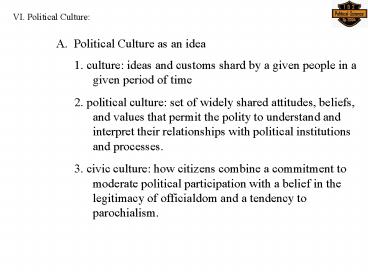Political Science 102: Introduction to Political Science - PowerPoint PPT Presentation
1 / 7
Title:
Political Science 102: Introduction to Political Science
Description:
b. Was politics a subject of discussion in your home when you were a child? Who talked about it? ... d. Media. e. events. VI. Political Culture: C. Political ... – PowerPoint PPT presentation
Number of Views:58
Avg rating:3.0/5.0
Title: Political Science 102: Introduction to Political Science
1
VI. Political Culture
A. Political Culture as an idea
1. culture ideas and customs shard by a given
people in a given period of time 2. political
culture set of widely shared attitudes, beliefs,
and values that permit the polity to understand
and interpret their relationships with political
institutions and processes. 3. civic culture how
citizens combine a commitment to moderate
political participation with a belief in the
legitimacy of officialdom and a tendency to
parochialism.
2
VI. Political Culture
B. Sub-nationalism
1. definition/description when a group within a
polity feel separated from their compatriots
because of variations in individual identity. 2.
Variables promoting sub-nationalism a.
ethnicity race b. religion c. class d.
gender age e. region f. language
3
VI. Political Culture
B. Sub-nationalism
3. Sub-nationalism a. highly subjective b.
develop in response to needs c. often
reactionary (fear of loss of standing)
4
VI. Political Culture
C. Political socialization
1. Means by which we acquire our our political
opinions, beliefs, and values.
a. What is your earliest political memory? b.
Was politics a subject of discussion in your home
when you were a child? Who talked about it?
Directly to you? Interested or apathetic? c.
Did the adults in your family vote? Did they
tell you how they voted? d. Was anyone in your
family actively involved in politics? In what
role? e. Do you know the words to the national
anthem? The pledge? How did you learn them? f.
What were the subject of history politics you
were taught in elementary school? High school?
5
VI. Political Culture
C. Political socialization
1. Means by which we acquire our our political
opinions, beliefs, and values.
g. When did you get into your first political
discussion? How did you feel about it? Who was
the discussion with? h. Do you watch the news on
television? Was the news on at night when you
were growing up? Did adults in your family
explain events and answer questions? i. Do you
pay attention to political campaigns? What makes
one candidate better than another? How do you
make these assessments?
6
VI. Political Culture
C. Political socialization
2. Agents of socialization a. Family b.
School c. Peers d. Media e. events
7
VI. Political Culture
C. Political socialization
3. variation in socialization a. age b.
race c. gender d. income e. region of the
country






























